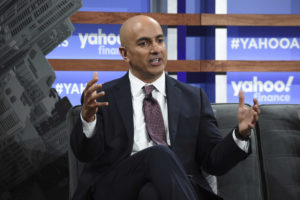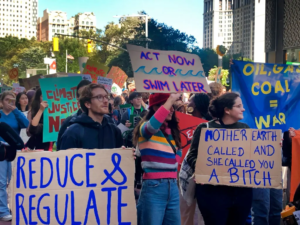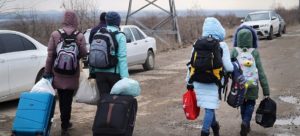One of the best-known indigenous defenders of the Amazon rainforest has died with coronavirus in Brazil, where the disease continues its rapid spread.
Paulinho Paiakan, chief of the Kayapó people, came to international attention in the 1980s in the fight against Belo Monte, one of the world’s largest dams.
He was around 65. In 1998, he was convicted of the rape of an 18-year-old, a case that hurt his reputation.
Covid-19 has hit Brazil’s vulnerable indigenous communities hard.
The country is among the world’s worst affected, and the outbreak is believed to be weeks away from its peak. Brazil has the second-highest numbers of infections – over 955,000 – and deaths, more than 46,500, after the US.
Paiakan was one of the most important indigenous voices during Brazil’s return to democracy in the 1980s, and helped lead the campaign for the creation of large indigenous reserves in the Amazon.
Alongside Kayapó chief Raoni and musician Sting, he brought attention to the impact of the construction of the Belo Monte hydroelectric dam on the Xingu river, in the Amazon. After many hurdles, a modified project was eventually built, and operation started in 2016.
He also fought to expel illegal miners and loggers from indigenous areas.
But his image was stained in 1992, after a student accused him of rape, a case that had worldwide repercussions. His allies argued the claim was fabricated to tarnish Paiakan’s reputation and to silence him.
After a long legal process, he was sentenced to six years in jail in 1998, but served only part of it under house arrest on his indigenous reserve in the northern state of Pará. His wife was found guilty of assisting him in the attack.
Reacting to his death on Wednesday at a hospital in Pará, the Brazilian Indigenous Peoples’ Association (Apib) described Paiakan as a “father, leader and warrior” for indigenous peoples and the environment.
Gert-Peter Bruch, founder of environmental group Planet Amazon, told AFP news agency: “He worked all his life to build worldwide alliances around indigenous peoples to save the Amazon. He was far ahead of his time. We’ve lost an extremely valuable guide.”
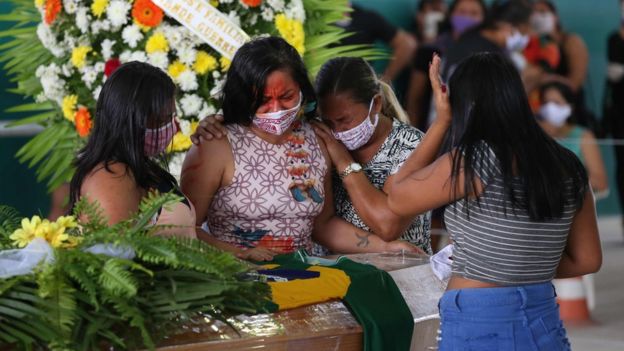
Across Brazil’s Amazon region, more than 280 indigenous people have died with coronavirus, according to Apib. There are special concerns about the outbreak in the area, where hospitals are underfunded and access to remote areas is difficult.
Pará, home to tens of thousands of indigenous people, has become one of the hardest-hit states in the country.
On Wednesday, Mike Ryan, emergencies programme head at the World Health Organization (WHO), said the outbreak in Brazil was still “quite severe”, and that the moment was of “extreme caution”.
Far-right President Jair Bolsonaro, who initially described the virus as a “little flu”, has been heavily criticised at home and abroad for his handling of the crisis. He has refused to follow WHO advice and two health ministers have left the job over disagreements with the president.
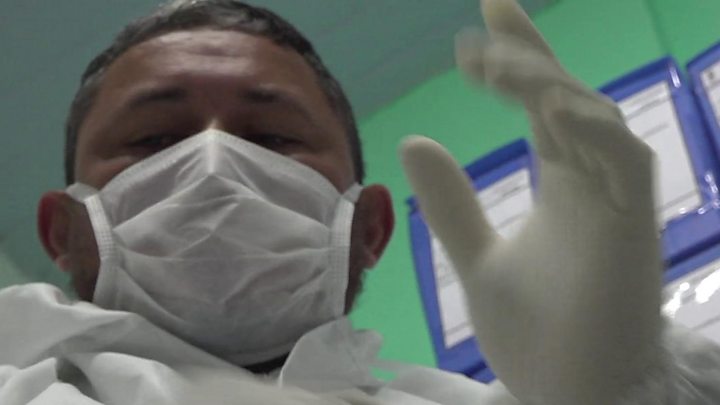
Earlier this month, his government stopped publishing data about the virus. It was forced to reverse the decision after being accused of trying to manipulate the numbers.
Mr Bolsonaro has also repeatedly criticised state and local authorities for imposing restrictions that have shut down large cities across the country. The measures have started to be lifted in some areas.


